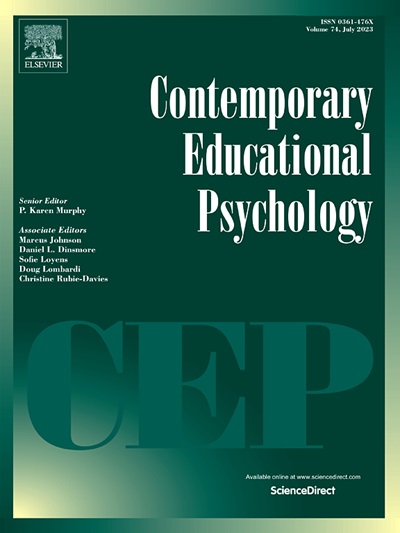Longitudinal reciprocal relations between trait test anxiety and performance goals during transition to secondary school: within- and between-person effects
IF 3.8
1区 心理学
Q1 PSYCHOLOGY, EDUCATIONAL
引用次数: 0
Abstract
Various studies have examined the relations between test anxiety and performance goals. As these are mainly cross-sectional, less is known about the directionality of these effects. Bringing together theoretical frameworks from motivation and emotion research, the present study aimed to examine the reciprocal within- and between-person links between trait test anxiety, performance-approach, and performance-avoidance goals in the time of transition to secondary school. Differential effects were analyzed for the two most common facets of test anxiety: worry and emotionality. For this purpose, we analyzed data of 1,770 students (MageT1 = 10.47, SD = 0.56; 51 % girls) before (4th grade) and after the transition (5th – 7th grade), using random intercept cross-lagged panel models (within-perspective) and cross-lagged panel models (between-perspective). The results support the idea of a predominance of worry and emotionality over performance-approach and performance-avoidance goals during transition to secondary school. No reciprocal effects were found. Comparing worry and emotionality, we found stronger and temporally more stable relationships of performance-approach and performance-avoidance goals with worry. The study provides a robust methodological framework, testing bidirectional emotional and motivational relations during the transition to secondary school. The results suggest that test anxiety is an important predictor of motivational coping after the transition to secondary school.
中转生特质测试焦虑与表现目标的纵向互惠关系:人内与人间效应
各种各样的研究调查了考试焦虑和成绩目标之间的关系。由于这些主要是横截面的,因此对这些影响的方向性知之甚少。本研究汇集了动机和情绪研究的理论框架,旨在考察中学过渡时期特质测试焦虑、表现接近和表现回避目标之间的相互关系。我们分析了考试焦虑最常见的两个方面的不同影响:担心和情绪化。为此,我们分析了1770名学生的数据(MageT1 = 10.47, SD = 0.56;使用随机截距交叉滞后面板模型(透视内)和交叉滞后面板模型(透视间),在过渡前(四年级)和过渡后(五年级至七年级)进行对比。研究结果支持了这样的观点,即在中学过渡阶段,焦虑和情绪比绩效接近目标和绩效回避目标更重要。没有发现相互作用。通过比较焦虑和情绪,我们发现绩效接近目标和绩效回避目标与焦虑之间的关系更强且暂时更稳定。该研究提供了一个强有力的方法框架,测试双向情感和动机关系在过渡到中学。结果表明,考试焦虑是中学生升学后动机性应对的重要预测因子。
本文章由计算机程序翻译,如有差异,请以英文原文为准。
求助全文
约1分钟内获得全文
求助全文
来源期刊

Contemporary Educational Psychology
PSYCHOLOGY, EDUCATIONAL-
CiteScore
16.50
自引率
3.90%
发文量
74
期刊介绍:
Contemporary Educational Psychology is a scholarly journal that publishes empirical research from various parts of the world. The research aims to substantially advance, extend, or re-envision the ongoing discourse in educational psychology research and practice. To be considered for publication, manuscripts must be well-grounded in a comprehensive theoretical and empirical framework. This framework should raise critical and timely questions that educational psychology currently faces. Additionally, the questions asked should be closely related to the chosen methodological approach, and the authors should provide actionable implications for education research and practice. The journal seeks to publish manuscripts that offer cutting-edge theoretical and methodological perspectives on critical and timely education questions.
The journal is abstracted and indexed in various databases, including Contents Pages in Education, Australian Educational Index, Current Contents, EBSCOhost, Education Index, ERA, PsycINFO, Sociology of Education Abstracts, PubMed/Medline, BIOSIS Previews, and others.
 求助内容:
求助内容: 应助结果提醒方式:
应助结果提醒方式:


